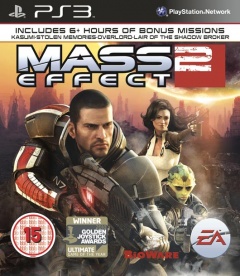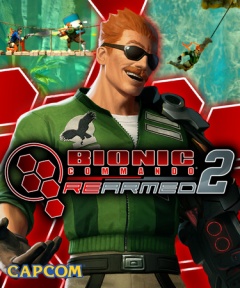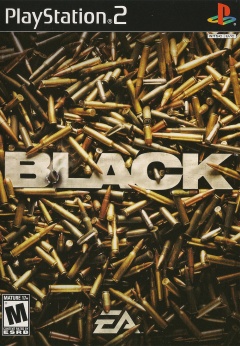explosive feng shui
Mass Effect 2 (PS3)
 Some games are just so damn popular and beloved that you can't ignore them, no matter how hard you try.
Some games are just so damn popular and beloved that you can't ignore them, no matter how hard you try.
When Mass Effect invaded my world in 2007, I couldn't have cared less. Sure, it was from the same BioWare that produced the excellent Knights of the Old Republic, and seducing blue women sounded like a pretty good time, but it definitely wasn't enough to put a 360 in my life. I'd grown weary of shooters of all kinds since burning out on Halo 2, and with RPG elements mashed in, it only seemed less enticing. I even gave the game a try last year on a friend's machine and didn't make it off the Citadel before losing interest.
The hype hasn't fallen on deaf ears, though. The rave reviews, rave first hour reviews, GOTY awards, and FOX News scare tactic hilarity all kept me up at night, wondering if I was missing out. EA was intent on making me give the series another shot, as they recently completed a PS3 port of Mass Effect 2. Because one of the series' bullet points is importing player-dictated narrative choices from the first game into the second, Dark Horse Comics was called in to help create a short interactive comic that fills in PS3 owners on some of the events that they missed out on from Commander Shepard's first adventure, even allowing the player to make some of the more important decisions to impact their experience with the full sequel.
As it turns out, that comic is DLC, unlockable either by a code included in the game's box or for $15. I rented the game and didn't plan on shelling out fifteen bucks for a fifteen minute comic, so I ended up going into the sequel without much knowledge from the first game. From that starting point aboard the exploding Normandy to the final trip through the Omega 4 relay, I've experienced just about everything included on the PS3 disc of Mass Effect 2 -- as much as you can in one playthrough, anyway -- as Elmer Shepard, a Vanguard of equal parts paragon and renegade, lover and fighter, savior and failure. And sometimes he forgets to feed his fish, and they die.
Greg has already written about the Mass Effect series extensively, having played both games and plenty of extra content on the 360. With that in mind, I'll try (but likely fail) to keep this brief. If you need a primer or refresher for the series, check out one of his excellent writeups. An avid fan of the series, he does a much better job of explaining the core elements of Mass Effect than I could.
Bionic Commando Rearmed 2
 Looking back, Bionic Commando Rearmed may have been a more
important game than most realize. It was one of the first blockbuster
hits on both the Xbox Live Arcade and PlayStation Network digital
distribution models, scoring critical praise unlike any other console
downloadable before it. It also arguably opened the floodgates for the
proliferation of retro-styled games and HD remakes: more and more
publishers are digging up their buried treasure and giving it a
spit-shine worthy of the HD era, and just as many are building new
experiences from old foundations.
Looking back, Bionic Commando Rearmed may have been a more
important game than most realize. It was one of the first blockbuster
hits on both the Xbox Live Arcade and PlayStation Network digital
distribution models, scoring critical praise unlike any other console
downloadable before it. It also arguably opened the floodgates for the
proliferation of retro-styled games and HD remakes: more and more
publishers are digging up their buried treasure and giving it a
spit-shine worthy of the HD era, and just as many are building new
experiences from old foundations.Some will cry foul at "Rad" Spencer's newfound ability to jump (gasp!), but it hardly appears to be the game-changer than many feared. Capcom has even affirmed that the game can be completed without ever taking a hop. I think I'll put that claim to the test for some of this first hour.
PS3 owners beware: Bionic Commando Rearmed 2 employs a type of DRM that requires you to start the game while connected to PlayStation Network. Inconvenient for a game that is played almost entirely offline.
Black
 When I think back to the first time I saw Sonic the Hedgehog running on
the Genesis (which I wasn't yet familiar with), I recall marveling at
how much better it looked than the Mario games I had at home. I remember
the time my brother tried to explain Super Mario 64 to me, and how
little I understood what he was saying until I finally witnessed it in
action. When I brought home a Gamecube the morning it launched, I was
impressed with the speed and fluidity of the Death Star trench run that
began Rogue Leader, at least when compared to its predecessor on the
N64. But the first time I saw Call of Duty 2 at Toys R Us on an HDTV
screen, the only thought that ran through my mind was...
When I think back to the first time I saw Sonic the Hedgehog running on
the Genesis (which I wasn't yet familiar with), I recall marveling at
how much better it looked than the Mario games I had at home. I remember
the time my brother tried to explain Super Mario 64 to me, and how
little I understood what he was saying until I finally witnessed it in
action. When I brought home a Gamecube the morning it launched, I was
impressed with the speed and fluidity of the Death Star trench run that
began Rogue Leader, at least when compared to its predecessor on the
N64. But the first time I saw Call of Duty 2 at Toys R Us on an HDTV
screen, the only thought that ran through my mind was...
"Really? This is next-gen?"
Yes, the characters were constructed of more polygons. And the textures were clearer. And of course, the higher resolution made everything easier to see. But I just couldn't help but feel a little disappointed, seeing that the the game, and others in the 360 launch library, just didn't seem to bring any worthwhile improvements to the table. In fact, it wasn't until the first time I saw Lost Planet's smoking RPG trails, gorgeous boss monsters, and swarms of flying enemies that the feeling of a new generation really sank in.
On the other hand, many quality games are released at the end of a console's life cycle, once developers have a firmer grasp on the intricacies of the hardware. It is unfortunate that they're often overlooked for the next console's rushed launch titles, but that's reality. EA's Criterion studio, creators of the high-octane Burnout series, attempted to buck that trend with Black, a first-person shooter for the PS2 and Xbox that was marketed as a next-gen shooter for current-gen platforms.
The game certainly looked impressive the first time I saw a friend playing it, some five years ago. Does it still pack a punch, or will Black forever be lost between generations?
